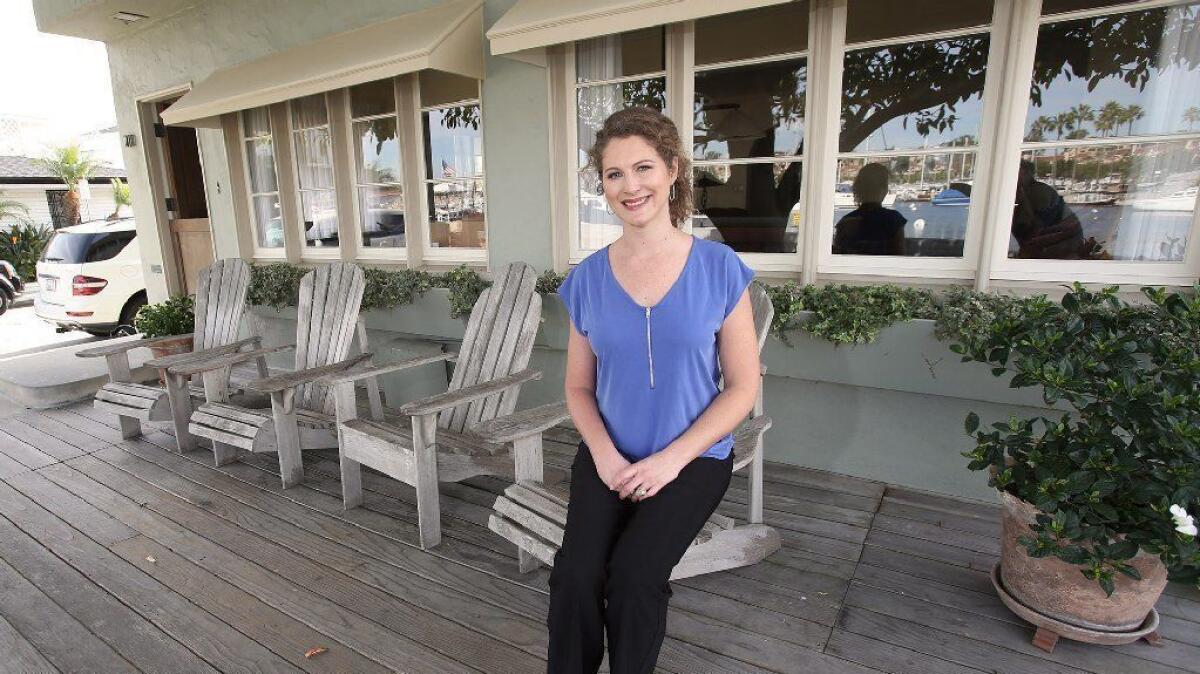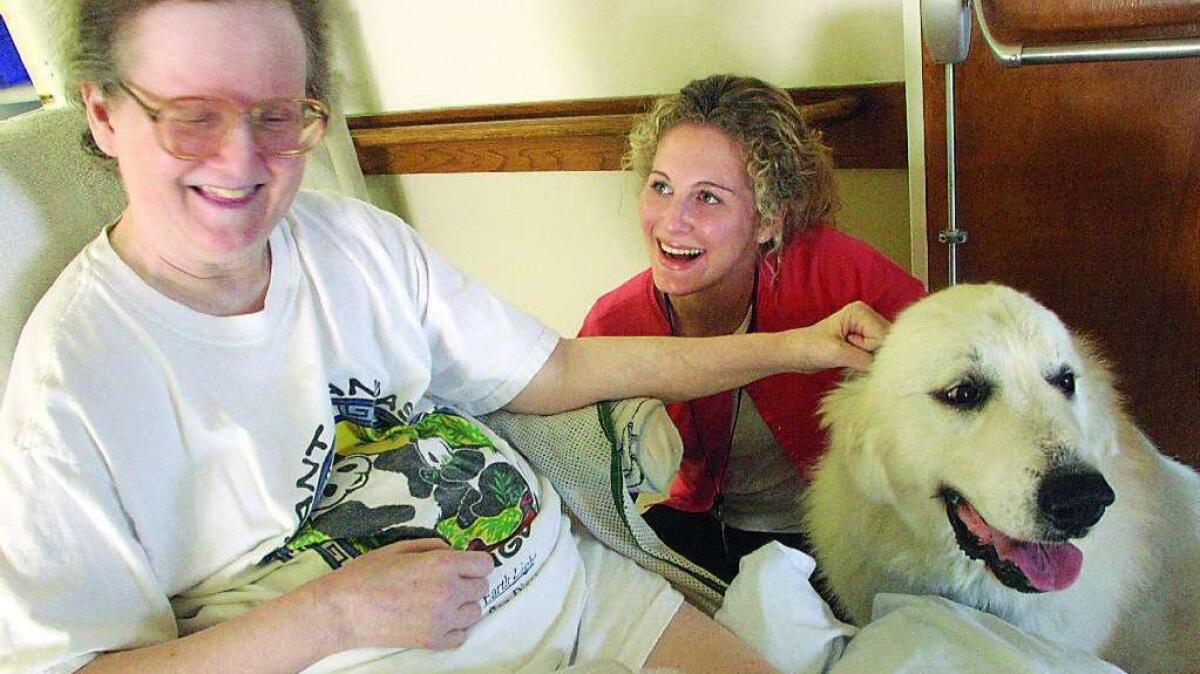Hospice Foundation’s Michelle Wulfestieg honored on National Philanthropy Day

- Share via
Where to begin the story of Michelle Wulfestieg?
With her stroke at age 11? The one that paralyzed her right arm and leg.
Or with her stroke at age 25? The one that took her whole body to the brink of death.
Or perhaps the story should begin the moment she says the voice of God told her: Go back!
“It was the hardest thing I’ve ever done,” she says, tearing up at the thought of that day 10 years ago.
But go back she did.
And when she woke up in the hospital — as her family planned her funeral and her friend wrote her eulogy — she vowed to dedicate the rest of her life to bringing comfort to the dying.
And then, unlike most who promise things when, say, the airplane hits severe turbulence and is being tossed around like a toy, she actually kept that vow.
Wulfestieg is the executive director of the Southern California Hospice Foundation, which has served more than 2,500 terminally ill children and adults, bringing them groceries and hands to hold — and sometimes celebrities like Oprah Winfrey and Selena Gomez.
It is why she has been named Orange County’s 2018 National Philanthropy Day Outstanding Founders Award recipient.
I wasn’t frustrated or angry because I knew I had a purpose.
— Michelle Wulfestieg
Growing up in a mountain town near Idyllwild, Wulfestieg built forts, climbed trees and rode motorcycles and horses.
It all changed the night in sixth grade while she lay stretching in bed. She heard a whooshing in her head and felt a pounding on her skull, and then she passed out.
Doctors did a scan and found a brain anomaly called an arteriovenous malformation, which had caused a stroke. It was so deep that surgery would likely kill her or damage her brain. They did radiation instead, but told her parents she probably wouldn’t live past 30.
A few weeks after radiation, Wulfestieg’s left leg went limp.
“Then my right arm went out completely, like dead meat,” she says.
Her hair fell out, her friends fell away. One classmate actually thought she was faking it for pity and pushed her out of her wheelchair. She felt hopeless and depressed, but determined.
“I thought, ‘You know what? I’m gonna do whatever I can to have my best life and be normal,’” she says.
She went out for the volleyball team, training her left hand to do what her right hand used to do. When all the girls ran, she walked.
“But I showed up every day and I made the team,” she says.
Later, when she was a student at California Lutheran University, she got a job taking notes — with her one good hand — for other students with disabilities.
It was at college that she signed up for a class called Death and Dying. One assignment was to volunteer at a hospice.
Wulfestieg, then 21, was assigned a grandmother named Betsy who had also had a stroke, but was bed-bound. She asked the woman what she missed most. Her answer: Reading.
“I said, ‘Let’s form a book club,’” Wulfestieg recounts. She began bringing books to her bedside to read aloud. When Betsy died two months later, her family asked Wulfestieg to give the eulogy.
Wulfestieg’s professor announced one day in the class that Wulfestieg had been asked to eulogize her patient — as had one other classmate. A boy named Steven.
“‘Oh my gosh the cute guy I’ve been eyeing all semester,’” Wulfestieg thought.
The feeling was apparently mutual. The cute guy waited for her after class that day. Six months later he proposed.

So he was the one who was with her two years later, the night she had her second stroke as she sat in their Newport Beach home, putting the final touches on her thesis for her master’s in leadership at Chapman University. Steven got her in the car and sped down the street to Fire Station No. 7, where he pounded on the door, hollering for help.
In fact, if not for Steven, she believes, she wouldn’t be here today.
He fought for her when they wanted to take her off life support later that night at Hoag Hospital, when the organ donors were being lined up.
“I was told my whole life that I wouldn’t live past 30, so my family was prepared,” Wulfestieg says. “But my husband was like, ‘No, I’m not going to lose my bride.’”
She was in the deepest coma, a level 3 on the Glasgow Coma Scale, basically brain dead.
When Wulfestieg tells this part of the story, it is with tissues in her hand, dabbing tears in her eyes.
“It was the most beautiful thing I’ve ever seen,” she says. “This beautiful warm place. And then I started hearing prayers, my mom and my husband. And then I heard prayers from everybody in the world, for everything we pray for, for hope, for healing, for forgiveness, for reconciliation.”
Eventually though she heard what she describes as “The Voice” telling her to go back. And then she heard her husband begging her over and over to open her eyes.
Finally, on her eighth day in the coma, she did.
“It was the hardest thing I ever did,” she says.
Back home, her husband set up a hospital bed in their living room. She could form thoughts, but could not yet speak. She would have to learn how to feed herself again too, and read, and walk. But she remembers a profound sense of peace.
“I wasn’t frustrated or angry because I knew I had a purpose,” she says.
Only five months later, in the spring of 2008, Wulfestieg, aided by two classmates supporting on either side, walked across the stage at Chapman to receive her master’s. Two years later, the Southern California Hospice Foundation hired her as their first employee to build their nonprofit.

Under Wulfestieg’s leadership, the foundation has partnered with hospices throughout Southern California to help more than 2,500 dying patients with basic needs, such as utility bill payments and groceries, and sometimes to grant dying wishes.
Last week, Wulfestieg caught wind that an 80-year-old surfer named Clifford wished to see the ocean one last time. The next morning she was at his house with a gurney. A van took them, along with his sister, to Balboa Peninsula. At 14th Street, they carried his gurney onto the sand down by the waves.
“There was not a cloud in the sky,” she says. “You could see Catalina Island. His sister held his hand.”
If a dying wish involves a celebrity crush, Wulfestieg isn’t shy about reaching out. Gomez, Harrison Ford and Winfrey are some of the stars she’s arranged visits with.
Wulfestieg’s story could be a Lifetime movie if it ended right there. But she isn’t finished. Her plan is to build a house for people who are facing the last days of their life but have nowhere to go and no money, so they can transition with dignity and peace. She is calling it the Heavenly Home Project. And she just launched the campaign.
Who am I to take on that challenge?” she says. “But if not me, then who?”
Lori Basheda is a contributor to Times Community News.
All the latest on Orange County from Orange County.
Get our free TimesOC newsletter.
You may occasionally receive promotional content from the Daily Pilot.



